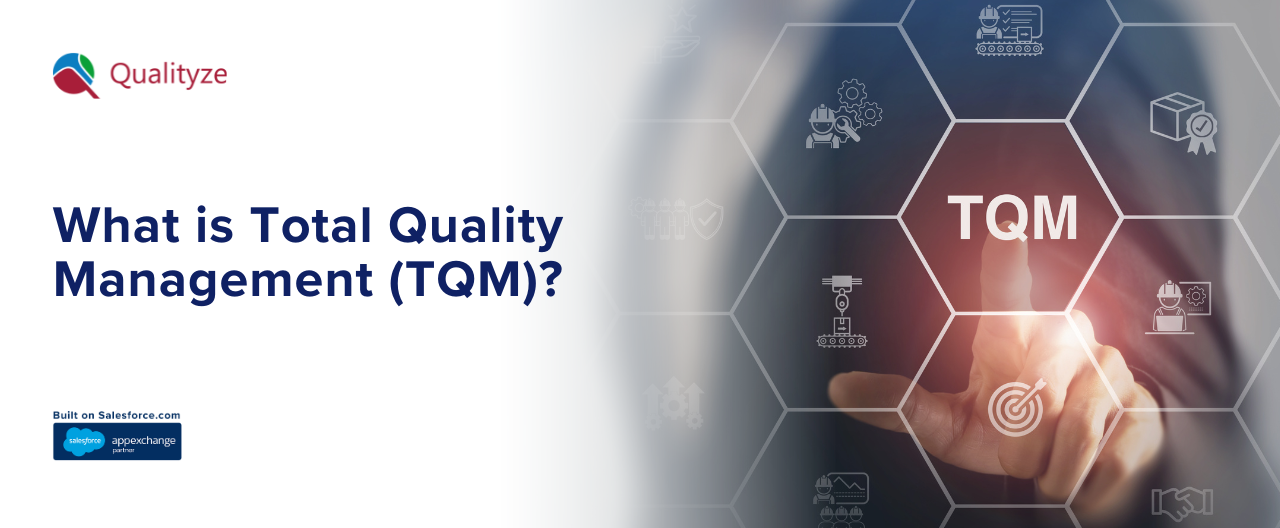

Calculate your potential savings with our ROI Calculator
ROI Calculator
While traditional quality control inspects the end product, Total Quality Management builds quality into the process itself. It's a company-wide approach to achieving excellence through consistency, collaboration, and continuous improvement.
In today's high-stakes business environment, delivering consistent quality is not a luxury, but a must. Total Quality Management (TQM) provides an orderly approach to infusing quality into all aspects of an organization. In contrast to conventional models that examine quality retrospectively, TQM focuses on prevention, cooperation, and continuous improvement.
Through engaging individuals in all functions and promoting ownership of results, TQM changes quality from being a task of the few to that of everyone. This proactive culture not only prevents costly mistakes but also boosts trust, openness, and efficiency of operations.
In this blog, you’ll gain a detailed understanding of Total Quality Management, including its importance, characteristics, principles, implementation steps, challenges, and how advanced tools—especially AI-powered QMS systems like those from Qualityze—support its execution.
Total Quality Management is a formal, company-wide philosophy for enhancing the quality of products, services, and processes through continuous feedback and cooperation. Instead of depending on end-of-production inspection, TQM inspires groups to embed quality in each stage of the flow of work.
Fundamentally, TQM is based on teamwork, leadership backing, data-driven decision-making, and customer satisfaction. It is developed from practices such as Kaizen, Lean, and Six Sigma to form a system of continuous improvement. All employees, ranging from senior executives to front-line workers, contribute to quality achievements.
Did you know? TQM gained international recognition due to leaders such as W. Edwards Deming and Joseph Juran, whose approaches redefined Japan's manufacturing sector during the 1950s. (ASQ)
With this established, let's see why TQM is still essential for contemporary organizations.
The applicability of Total Quality Management now is in its power to propel improved outcomes in operations, compliance, and customer satisfaction. In sectors that include healthcare, manufacturing, and pharma—where regulatory compliance is stringent—TQM becomes critical.
Here's why it matters:
Instead of depending on audits or external measurement, TQM promotes excellence in internal processes. It ensures improvement is ongoing and backed by current insights.
Stat insight! Organizations with well-established TQM systems have between 40% fewer product-related complaints and 15-25% operational improvement in the first year. (McKinsey)
Let us now examine the most important features that make a strong TQM culture.
A successful TQM approach is not just paperwork—it's a vibrant culture defined by these attributes:
Organizations embracing these characteristics establish a culture in which accountability, betterment, and quality become second nature.
Did you know? Firms with a mature quality culture have fewer internal failures and a 60% higher customer satisfaction rate. (Harvard Business Review)
Transition: These characteristics come alive through core principles—let's discuss those next.
Total Quality Management values serve as guiding principles in the creation of a cohesive, high-performing organization. These are what they consist of:
These are not theoretical concepts—they're crucial to developing sustainable processes and maintaining compliance.
Having laid out the principles, the question then is—how do organizations effectively apply them?
Applying TQM is a process that requires structure, patience, and commitment from throughout the organization. Here's a workable step-by-step journey:
From the fact file! Companies that have definite implementation models have a 30% higher chance of maintaining long-term TQM success.
Though planned steps assist, leaders usually encounter challenges in implementation. Let's discuss them.
The solution? Transparency, cross-functional ownership, and consistent communication. Technology, too, can help streamline processes and maintain alignment.
Despite the obstacles, the payoff of TQM is substantial. Let’s review its key benefits.
The benefits of a well-executed Total Quality Management strategy go beyond regulatory compliance:
All these benefits turn TQM into more than a methodology – a competitive approach.
TQM is even more effective when accompanied by internationally accepted standards.
Worldwide quality frameworks provide discipline and legitimacy to TQM programs. Some of the most popular ones are:
These frameworks allow organizations to convert intangible objectives into tangible, measurable results.
Did you know? More than 1 million companies across the world are ISO 9001 certified, demonstrating its role in establishing quality standards. (ISO)
But systems alone are not enough. The proper systems and tools make TQM scalable.
Digital tools impose consistency and control on complex quality processes. Typical TQM systems are:
These tools keep quality data centralized, enable automation, and provide traceability. They enable teams to act fast, remain compliant, and eliminate manual errors.
As AI capabilities come into the equation, quality systems are getting smarter and more reactive. Here's the way Qualityze gets involved.
AI is transforming quality management through predictive insights, automation, and real-time analysis. Qualityze capitalizes on this technology with its Salesforce-born QMS.
With functionalities such as:
Qualityze enables companies to enhance their Total Quality Management methodologies, mitigate risk, and ensure compliance while improving user experience and productivity.
Let's conclude with the major key takeaways of today’s agenda in the next section.
Total Quality Management adoption is no longer a choice—it's a performance-driving, compliance-driving, customer-trust-driving strategic choice. Once quality is an integral part of the organization's mindset, excellence becomes predictable.
Key Takeaways:
Cloud-based, AI-driven quality management solutions from Qualityze assist teams in streamlining compliance, reducing risk, and improving operations continuously.
See how Qualityze can assist in revolutionizing your quality processes.
Author

Qualityze Editorial is the unified voice of Qualityze, sharing expert insights on quality excellence, regulatory compliance, and enterprise digitalization. Backed by deep industry expertise, our content empowers life sciences and regulated organizations to navigate complex regulations, optimize quality systems, and achieve operational excellence.